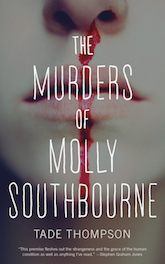Let’s talk about clones and narratives. As anyone who’s read or watched a story dealing with clones can attest, introducing cloning into a narrative allows storytellers to explore a host of themes: nature versus nurture, the notion of what makes a person unique, the question of what happens when human rights and rampant corporatism collide. In a myriad number of books, stories, televisions shows, and films, cloning has been used to illustrate a wide array of themes and questions—ultimately getting to some genuinely primal ones. What makes us human? What does having the power to replicate a person imply for humanity? And what would it be like to discover that you yourself are not unique?
These themes have been explored in a host of acclaimed books, including a few classics of the genre. Kate Wilhelm’s award-winning 1976 novel Where Late the Sweet Birds Sang is one example. In its opening pages, we’re introduced to a character with a serious yearning for his cousin—quickly leaving the reader unclear if they’re meant to view this as an instance of star-crossed love or as something a little dodgier. As it turns out, there’s an honest-to-goodness plot reason for it—a looming societal collapse. Given that this particular family abounds with scientists looking to preserve humanity via cloning—albeit from a limited genetic pool—this leads to several characters pondering the question of the genetic issues that can arise when cousins have kids.
This initially-disorienting narrative choice ends up being critical to the plot. It’s a means of showing how certain very specific questions can go on to have narrative applications on a scale far beyond what might have been initially expected. As Wilhelm’s novel shifts and changes shape, what became the intimate story of a family under duress turns into an account of how humanity might be preserved—and how it might evolve into something else. Narratively, one can look at it as a narrative ancestor of Neal Stephenson’s Seveneves, turning familiar scenes into the stuff around which future societies are made.
Cloning can come at essential questions of humanity (and post-humanity) from other angles as well. The tripartate structure of Gene Wolfe’s 1972 The Fifth Head of Cerberus causes a constant shifting and refocusing as to what the book is actually about. It’s set on a distant world where some of humanity’s worst tendencies—including slavery and genocide—have been preserved. But the narrative is by turns paranoid and dreamlike, and the form by which Wolfe tells the story is also one that goes through multiple permutations. By the end of the book, Wolfe has delineated a cast of characters that includes humans, their cloned offspring, and shapeshifting aliens who may have adopted human forms and memories. Much as each of the book’s sections is written in a vastly different style, so too is Wolfe approaching archetypal science fictional questions from multiple angles, and showing the common ground among them.
 There’s a decidedly visceral take on cloning in Tade Thompson’s The Murders of Molly Southbourne. The title character grows up on a farm with her loving parents. It’s an isolated life, but a warm and happy one—but one that’s not without its dangers. Molly has a peculiar condition, it turns out: when she bleeds, her blood will eventually grow into a clone of her if it isn’t burned first. The passages describing this process are among the most unsettling in the book.
There’s a decidedly visceral take on cloning in Tade Thompson’s The Murders of Molly Southbourne. The title character grows up on a farm with her loving parents. It’s an isolated life, but a warm and happy one—but one that’s not without its dangers. Molly has a peculiar condition, it turns out: when she bleeds, her blood will eventually grow into a clone of her if it isn’t burned first. The passages describing this process are among the most unsettling in the book.
Thompson’s book isn’t a “wacky misunderstanding” clone narrative: after a certain amount of time, Molly’s clones turn murderous. Which means that by the time she’s reached adulthood, Molly has seen her double killed—largely at her own hand—an abundance of times. The fact that she refers to them as “mollys,” and the lower-case “m”, is significant. Molly herself doesn’t view the mollys as entirely human—but this wouldn’t be a good novel of clones if there wasn’t some narrative ambiguity thrown in there as to whether her beliefs are correct.
Over the course of the book, Thompson doesn’t focus too much on the mechanics of how Molly’s condition arose, though he also doesn’t leave it unaddressed. He’s more interested in exploring the effects of it on her and the people closest to her: what does it do to someone to learn that they have this power—and what does it mean when the only logical response is to handle things with lethal force? For all that this novel centers on the literal viscera that surrounds Molly, it also doesn’t deny the headiness of the questions posed by its premise. What does it do to someone to be in a constant state of tension, monitoring the world for a murderous figure who’s also your twin? What are the implications of this? And how does one balance managing this condition with striving for a semblance of a normal life?
Narratives about clones frequently tap into one, if not both of the following concepts: what do the existence of human clones say about our own uniqueness, and what does the creation of clones say about humanity’s place in the evolutionary chain? There are a host of ways that one can approach this, blending the cerebral and the visceral in unexpected ways. The Murders of Molly Southbourne is an unexpected addition to this subgenre, and its methods of posing these questions are haunting indeed.
 Tobias Carroll is the managing editor of Vol.1 Brooklyn. He is the author of the short story collection Transitory (Civil Coping Mechanisms) and the novel Reel (Rare Bird Books).
Tobias Carroll is the managing editor of Vol.1 Brooklyn. He is the author of the short story collection Transitory (Civil Coping Mechanisms) and the novel Reel (Rare Bird Books).










